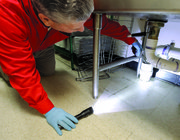Duane Gantz steps over the stuffed animals and toy baby stroller that were abandoned on the floor of a child's room, approaches the window and crouches to spray a white powder in the crease between the window and the sill.
It's Gantz's first stop of the day on a route that might run from eight to 10 appointments, and the powder is a chemical used to kill smoky brown roaches, commonly known as water bugs. If the insects scuttle over the powder, it will stick to their exoskeletons; they will carry it back to their nests.
"We want them to share it with the family," Gantz said. "Total eradication."
This Little Rock home is one of about 5,000 that Legacy Termites & Pest Control serves, said Juan Perez, Little Rock branch manager.
Homeowners can expect to see termites, rodents, and ants creeping into their abodes along with the roaches in the coming months, a result of rain pressure and winter temperatures, said Jim Fredericks, the chief entomologist with the National Pest Management Association.
The association organizes a yearly study to analyze what types of pests regions should expect, dependant on temperatures and humidity levels. This is the third year for the study.
A team of entomologists conducts the research, compiling data based on weather patterns. This year, flooding from hurricanes had an impact on mosquito populations across much of the United States, Fredericks said.
While insects like termites are generally active all year, seeking sanctuary from the winter in houses, mosquitoes are usually only active during the warmer months.
But Fredericks said an anticipated warm winter and flooding could mean they will stick around longer.
High levels of rainfall leave standing water in forgotten pet bowls, flower pots or hollow tree stumps, which Fredericks said is prime breeding ground for these insects.
Flooding in southeastern Arkansas during the summer may have also driven mice and rats from their underground homes, causing them to sniff out any cracks or crevices, wiggle their way into human homes and set up camp there, Fredericks said.
Jerry Hyde, owner of Hyde Pest Control in Paragould, said he mostly sees rodents at farm accounts, where clients complain that rats are gnawing at the wires on their combines.
Perez said that he and his crew generally see the most rodents in houses during winter months. They tend to try to nest inside when it gets cold.
For many of the Legacy accounts, technicians put small black boxes baited with green packages full of a greasy chemical that kills the rodents.
They eat the chemicals, which makes them thirsty. When the pests drink water, it thins their blood and they die, Gantz explained as he put fresh bait in a box at a pizza shop in west Little Rock.
Gantz, who likes to deer hunt in his spare time, has been in the extermination business for 27 years, he said.
He said that ants, which are most prevalent during the summer, are easiest to treat before they get into the house by spraying sidewalk cracks and the exterior of the house with chemicals. These sprays don't kill the insects until later, when they have crept back to the nest.
The queen gets under the concrete slabs, where she can stay safe, but when worker ants bring it back to the nest, the problem is eliminated, Gantz said.
Fredericks said Arkansas can expect a reasonably warm winter, which means that ants could remain active for longer.
"As the weather starts to cool, ants may look inside looking for food," he said. "We also would expect that ants could actually be moving inside to escape the [lower] temperature but also to look for food and other resources."
Perez said cockroaches may also be looking to move inside to escape the crisper air.
"They get in through any little avenue," he said. "They tend to invade any crawl space."
Hyde said most cockroaches enter homes traveling on something else -- groceries or a piece of furniture.
The best way to prevent these insects from coming in is to "build them out" with sealed doorways, filling any cracks in the wall or double-paned windows, experts said.
But termites tend to be more difficult to "build out," and Perez said it is best to call in experts to check for their colonies because they often leave no signs until significant damage has been done to a structure.
"This is what a wall with termites looks like," he said, pointing to the pristine white wall behind him in the Legacy office.
Chris Maloch, who has been working for Legacy since it began in 2009 and worked in extermination for Terminix Inc. before that, said the job gets much more difficult when people wait to call about termite damage.
"We get a lot of calls from people saying 'Hey this looks funny' or 'I went to paint my wall and it crumbled,'" Maloch said.
The National Pest Management Association, which publishes several publications on pest prevention, advocates for calling in experts, Fredericks said.
"Pest control isn't necessarily a do-it-yourself kind of job," Fredericks said. "A lot of times the instinct for homeowners is to try to take care of it on their own, but we encourage folks to reach out to pest management."
Perez and Maloch said people can treat pests on their own by buying the chemicals themselves and treating their homes regularly, but most do not have the patience or expertise to do it effectively.
"We get a lot of people that attempt to do it, and they see short term results but the bugs are back in a few weeks," Maloch said.
On one of his stops, Gantz stirred a fire ant nest with a gloved finger, but none of the workers came out to defend their home. The business owner had sprayed them down with water, trying to keep her restaurant bug-free.
Gantz said this meant they might come back because he didn't have the chance to treat the colony with the proper blend of chemicals while they were still living there.
He sprayed it anyway.
HomeStyle on 11/04/2017




